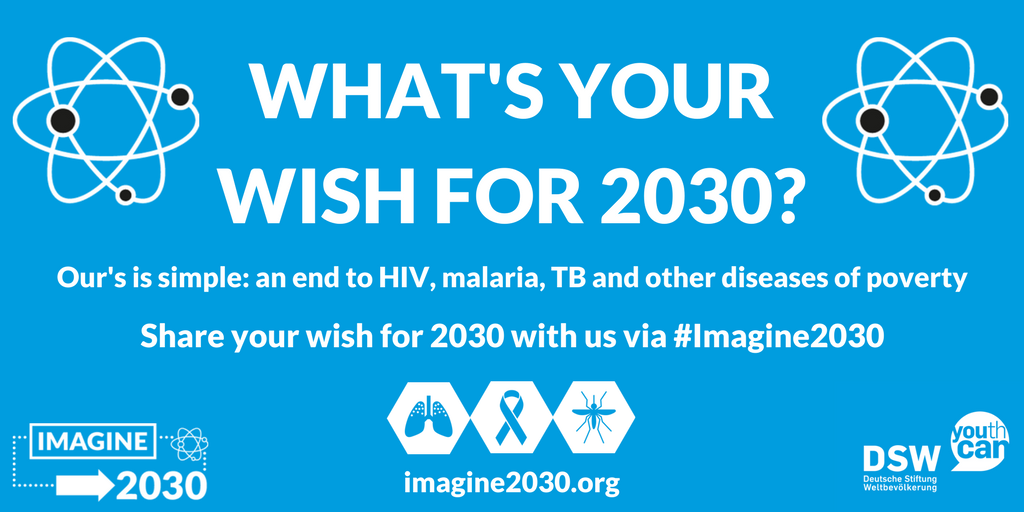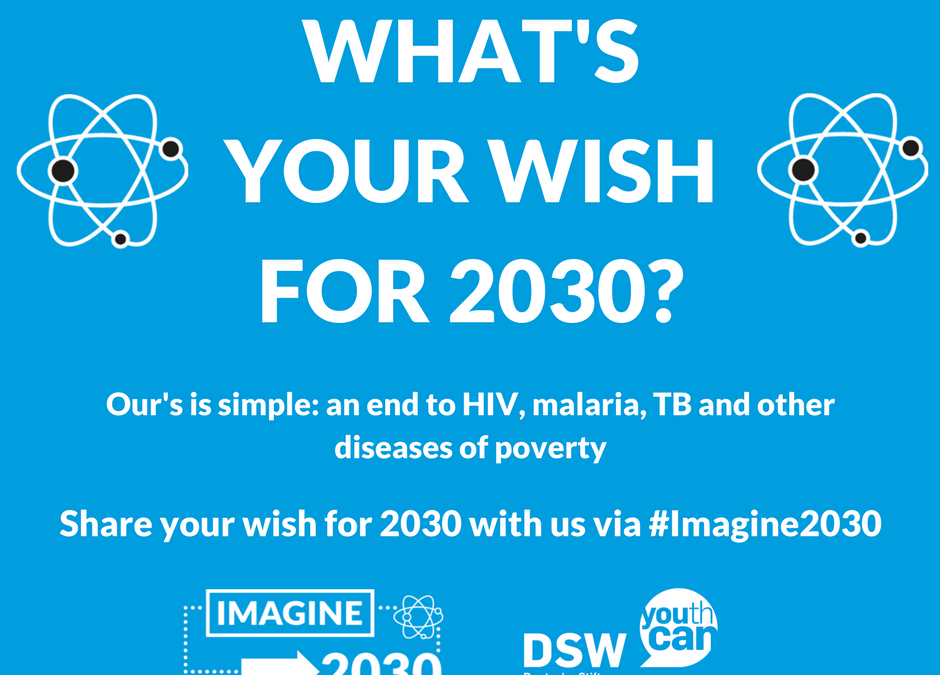 Our Imagine2030 wishes? Here at DSW, we have one big one for how the world will look or change by 2030: an end to diseases of poverty. No more HIV. No more Malaria. No more Tuberculosis. No more Neglected Tropical Diseases. We realise that this is not just going to happen all by itself, which is why we launched our Imagine2030 campaign in December 2016, to forcefully bring this message to European leaders, and to build momentum to make this future a reality!
Our Imagine2030 wishes? Here at DSW, we have one big one for how the world will look or change by 2030: an end to diseases of poverty. No more HIV. No more Malaria. No more Tuberculosis. No more Neglected Tropical Diseases. We realise that this is not just going to happen all by itself, which is why we launched our Imagine2030 campaign in December 2016, to forcefully bring this message to European leaders, and to build momentum to make this future a reality!
To celebrate this, and the debut of the Imagine2030 campaign at the European Development Days conference in Brussels in June, starting on May 17 we are asking you to share with us: what’s your wish for 2030?
Throughout May, we will be inviting people to share their Imagine2030 wishes for the next decade via social media. We will collect these and include them as part of our Imagine2030 showcase at the Development Days on June 7-8. At this conference in Brussels we will also be asking attendees – European and international decision-makers, politicians and civil society representatives – their wishes for 2030.
So, share with us your Imagine2030 wishes for 2030 – on Twitter, Facebook or Instagram – using the hashtag #Imagine2030, and together will can continue to build momentum behind increased investment in global health to fight diseases of poverty!
What is the Imagine2030 campaign? DSW is committed to a world without diseases of poverty by 2030. In order to end the epidemics of HIV & AIDS, tuberculosis, malaria, and neglected tropical diseases, we need new vaccines, new and better medicines, and improved diagnostic tools. We believe that, to achieve this, European political and financial support for global health innovation is crucial. The Imagine2030 campaign is focused on raising awareness about this need in 2017.
Deutsche Stiftung Weltbevölkerung (DSW) focuses on the needs and potential of the largest youth generation in history. We are committed to creating demand for and access to health information, services and supplies, and to securing their right for a brighter future. We achieve this by engaging in gender sensitive advocacy, capacity development, and family planning initiatives. With our headquarters Germany, DSW maintains offices in Ethiopia, Kenya, Tanzania, and Uganda, as well as liaison offices in Berlin and Brussels. DSW also advocates for investment in research and innovation to fight poverty-related and neglected tropical diseases.
Diseases of poverty, also known as poverty-related and neglected tropical diseases (PRNDs) is a category that includes, among others, HIV & AIDS, tuberculosis, malaria and 17 neglected tropical diseases identified by the World Health Organisation: Buruli ulcer, Chagas disease, Dengue and Chikungunya, Dracunculiasis (guinea-worm disease), Echinococcosis, Foodborne trematodiases, Human African trypanosomiasis (sleeping sickness), Leishmaniasis, Leprosy (Hansen’s disease), Lymphatic filariasis, Onchocerciasis (river blindness), Rabies, Schistosomiasis, Soil-transmitted helminthiases, Taeniasis/Cysticercosis, Trachoma, Yaws (Endemic treponematoses).

